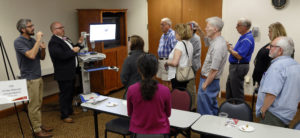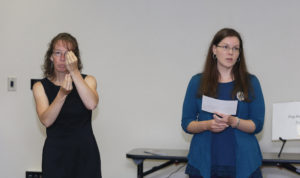Three years ago this month Rita Wertman faced a terrifying crisis.
Rita had been brought to the emergency room of Augusta Health Hospital for chest pain, but because she is deaf, she could not understand the doctors and nurses, and they could not understand her. Fortunately for Rita, she had her daughter, Ronna Wertman, beside her, and Ronna could interpret for her with American Sign Language (ASL).

Participants in the Information Session watch as the new technology is explained.
Treatment, observation, and testing went on for more than 17 hours straight. Ronna asked whether an interpreter was available, but no one could be found. Ronna was told there was an iPad with video interpretation, but no one knew where it was. She was told an interpreter would be provided in a few hours, but even the next morning there still was no interpreter. In the end, she had to find one herself.
Ronna was determined to do something about this problem. She knew from meeting with others in the deaf community that this experience was the norm, not the exception, and many people had gone through far worse. Hospital staff had good intentions, but they were also very busy. No one was specifically assigned to handle these needs or make sure the available resources were accessible.
“Sometimes people ask why it isn’t enough for the deaf and hard of hearing to rely on family members for assistance,” Ronna said. She listed several vital answers:
First, not every deaf person has a family interpreter available whenever they need to see a doctor!
“Second,” Ronna said, “patients have a right to privacy.” Many do not wish to share all of their health information with family. “They also want to make decisions for themselves. Family interpreters can easily influence the decisions of a deaf person in the way they translate the doctor’s statements, and they have a great deal of power to decide what to translate for the doctor.”
Finally, Ronna said, “It’s also a heavy responsibility for family. What if I make a mistake? I would have to live with that for the rest of my life.”

Ronna Wertman, right, and interpreter Wendy Fletcher welcome attendees at the Augusta Health Information Center. Wendy is signing the word “information.”
Ronna Wertman didn’t let the questions raised by her mother’s hospital experience fade away after Rita returned to good health. She wanted to prevent what had happened to them from happening to others. She contacted the Patient Advocate at the hospital, and the local outreach specialist with Deaf and Hard of Hearing Services Center in Virginia. A House Bill in the General Assembly was drafted around that time, with guidelines for hospitals to provide effective communication for deaf patients. Still, Ronna didn’t see any changes happening at Augusta Health.
Then she heard about Virginia Organizing. Someone at her church brought in a petition to “Ban the Box,” a campaign Virginia Organizing organized to reduce discrimination against returning citizens by employers. Ronna joined the Staunton-Augusta-Waynesboro Chapter and began to work on her campaign with the help of local Virginia Organizing members.
First, there was a meeting with the Virginia Department for the Deaf and Hard of Hearing in Richmond. The Director of VDDHH said that the guidelines the Department of Health was working on, as directed by the Virginia General Assembly, would be strictly voluntary.
Virginia Organizing would have to move from one hospital to another, asking for change. They would have to convince hospital officials to do more than the minimum requirements of the federal disabilities laws.
Ronna was asked to join the stakeholder meetings at the Department of Health. She shared her story of the experience she and her mother had at Augusta Health and helped write stronger — but voluntary — guidelines.
By December 2015, Ronna had recruited directly affected community members to the chapter who were willing to work hard to make these changes. The Virginia Hospital and Health Care Association connected Virginia Organizing with high-level officials of Augusta Health, and the chapter members met with them to tell their stories of the things that had happened when they tried to receive health care at the hospital.
Augusta Health promised to develop a plan to address these problems. Specifically, they agreed to:
- provide reliable access to interpretation
- provide a central point of contact in case of problems
- use video remote interpretation only in emergencies and give patients the choice of a live interpreter
- improve training for all hospital staff on how to provide interpretation
Throughout 2016 there were focus group meetings. Augusta Health developed a contract with Civic Access to provide live, on-site interpreters, and that contract went into effect in January 2017.
Throughout 2017 the campaign focused on getting the word out about the new services and also reminding Augusta Health whenever there were problems.
In the end, Augusta Health came through with everything the Staunton/Augusta/Waynesboro Chapter originally asked for.
According to Ronna Wertman, “All patients will be asked at pre-registration whether they require interpretation or any accommodation for their needs. A video remote interpreting unit that is innovative, hard wired, stand alone, and visible from a bed is available to patients. Live interpretation is also available.”
“Disability Awareness and Sensitivity Training is required for all hospital employees every year, and after training they have to pass a test. An orientation is available for new employees as well,” she said.
In short, Augusta Health now meets the gold standard of care for deaf and hard of hearing patients!
Virginia Organizing hopes to organize with the deaf community in other communities and work with other hospitals to help them provide the same benefits to patients.




